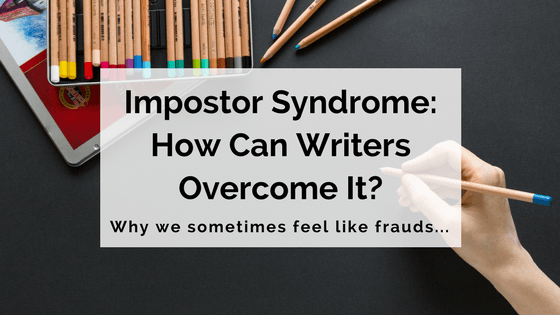Have the words ‘I’m not a real writer’ ever crossed your mind?
Have you ever felt that your writing skills are inadequate, despite evidence to the contrary?
Have you ever achieved success with your writing, only to think, ‘How did I get here/I don’t know what I’m doing/I don’t deserve this’?
If any of the above rings true, you may be struggling with something called impostor syndrome.

What is impostor syndrome?
First identified by clinical psychologists Pauline Clance and Suzanne Imes in 1978, impostor syndrome refers to feelings of fraud and self-doubt experienced mainly by high-achieving individuals.
These individuals are convinced that they are not really knowledgeable, skilled or talented in their area of expertise – that they have somehow fooled people, scammed their way to success, and will be exposed sooner or later as the fraud they really are.
People suffering from impostor syndrome often downplay or disregard concrete evidence of talent or success, instead believing 100% in their supposed inadequacy and inauthenticity. As psychologist Joseph Cilona, speaking to Mental Floss, points out:
Those struggling with impostor syndrome tend to attribute success to luck rather than merit and hard work, and also generally tend to minimise success.”
Impostor syndrome can affect anyone in any industry or profession. But here, of course, we’re going to talk about impostor syndrome specifically as it relates to writers.

How does impostor syndrome affect writers?
Writers are some of the most susceptible people when it comes to impostor syndrome.
What writer hasn’t doubted their knowledge, skills or talent at some point or another? What writer hasn’t shied away from or brushed off praise or encouragement, not from modesty but from a genuine lack of confidence and conviction in their work?
While impostor syndrome, by definition, is usually experienced by high-achieving individuals, you don’t necessarily have to achieve success as a writer to feel like an impostor. The mere act of calling yourself a writer, of actively pursuing a career in writing, can lead to the same feelings of fraud and self-doubt.
Unpublished and self-published authors can be particularly susceptible to the effects of impostor syndrome. Without a traditional publishing team to back them up, as-yet-unpublished and independent authors can feel like their work hasn’t really been validated, and is therefore undeserving of being put out into the world.
However, traditionally published authors aren’t exempt from experiencing impostor syndrome. In fact, one of the keystones of the syndrome is a conviction that, despite hard evidence to the contrary (such as a publisher choosing to publish your work), you still believe that, somehow, your success isn’t authentic. You may even fear that your publishers may realise you’re a ‘fraud’ and drop you at any moment.
As well as making you feel inadequate as a person and a writer, impostor syndrome can have a terrible effect on your writing itself. Never-ending self-editing, relentless critiquing of your own work, second-guessing your writing decisions, and worst of all, avoiding writing altogether – these are all signs you’ve fallen victim to this dreaded condition.
As you can see, any writer – from beginner to successful published author – can experience impostor syndrome. And it’s dangerous; these feelings can have a huge negative effect on both your writing and your mental health.
So what can you do to get past it?

How can I overcome impostor syndrome?
The first step to overcoming impostor syndrome is recognising that you’re experiencing it. Putting a name to your feelings of self-doubt and inadequacy is vital. It’s not just a simple lack of confidence; it’s a very real condition that can dangerously skew your perspective of yourself and your skills as a writer.
It is important to note, though, that there’s a difference between simply having trouble with your writing (something that happens to every writer) and experiencing impostor syndrome.
If you’re struggling to write a particular story, for example, try looking for the telltale signs that let you know it’s time to quit a writing project. If you can’t identify with any of these, it’s most likely an internal problem rather than a problem with that particular project – and that internal problem might be impostor syndrome.
Once you understand that you are experiencing this difficult syndrome, you can actively work towards adjusting your mindset and restoring your confidence in yourself and your abilities.
Let’s take a look at five things you can do to overcome impostor syndrome.

1. Remember you’re not alone
One of the most important things to keep in mind if you’re suffering from impostor syndrome is that you are not alone.
Plenty of writers experience feelings of fraudulence or inadequacy, even – perhaps especially – big-name, successful authors. Take best-selling, award-winning author Neil Gaiman, for example:
The first problem of any kind of even limited success is the unshakable conviction that you are getting away with something, and that any moment now they will discover you. It’s impostor syndrome, something my wife Amanda christened the Fraud Police.
In my case, I was convinced that there would be a knock on the door, and a man with a clipboard … would be there, to tell me it was all over, and they had caught up with me, and now I would have to go and get a real job, one that didn’t consist of making things up and writing them down.”
Even Maya Angelou, whose writing career spanned more than 50 years, was a victim of the syndrome:
Each time I write a book, every time I face that yellow pad, the challenge is so great. I have written eleven books, but each time I think, ‘Uh oh, they’re going to find out now. I’ve run a game on everybody and they’re going to find me out.’”
If these kinds of hugely famous and successful writers can experience impostor syndrome, it’s no wonder that we emerging writers do, too!
Remembering that it’s not just you feeling this way can help you work to move past the syndrome. Psychotherapist Katherine Schafler, also speaking to Mental Floss, points out that ‘impostor syndrome thrives on isolation’, which brings us to our next piece of advice…

2. Talk to other writers
Chances are, most of the other writers you know will have experienced the same ‘impostor’ feelings as you at some stage or another. Talking to one another about these feelings is vital to overcoming them.
Get together with a fellow writer for a coffee, or simply have a chat over the phone or online. Talk about how you’re feeling and what you’re struggling with, and ask whether they’ve had (or are also currently having) a similar experience. Put your minds together to come up with ways to boost your confidence and self-worth as a writer.
Even just the act of expressing your concerns out loud can be helpful in itself. Many writers will internalise their struggle with impostor syndrome, afraid to voice the fact that they’re feeling like a fraud (perhaps fearing that someone will confirm it). Getting things off your chest, especially to someone who likely knows exactly what you’re talking about, is a great step towards regaining your confidence.
We’ve explored the reasons why writers need a literary community before, and they all apply here. Surrounding yourself with people who can empathise with the struggles you’re going through will do wonders for overcoming the symptoms of impostor syndrome.

3. Remind yourself how hard you’ve worked to get here
This applies particularly to those who have achieved success with their writing, but are now doubting the validity of their achievements, questioning whether they really deserve them.
If you start to feel like your writing success is due to luck, chance or accident, stop. Take a moment to remind yourself of all the hard work that went into getting you where you are today.
Remember the countless hours you poured into your manuscript or writing project? Remember all those sleepless nights you spent furiously writing or revising? Remember the passion, dedication and effort you’ve been putting in for weeks, months, years on end?
Bring all that hard work to mind, and the assumption that you’re an undeserving fraud will begin to make less and less sense.
Blood, sweat and tears got you here, not a clever ruse or a lucky break. You’ve earned every bit of success you’ve achieved. So instead of second-guessing your achievements, reward and congratulate yourself on them. You deserve it.

4. Reflect on positive feedback
If you find your mind being overtaken by negative thoughts, take some time to reflect on positive feedback you’ve been given. This might be feedback on a submission or competition entry, comments from reviewers or beta readers, or even just a positive word or two from a writer friend.
This is less an ego-stroking exercise and more a reality check. Writers suffering from impostor syndrome inherently believe that they’re not actually good at writing at all, even when there’s evidence that says otherwise. To overcome this, you need to accept what others are saying about you; you need to believe the positive comments as much as they do.
First, try to get out of the habit of automatically dismissing positive feedback. Many writers will find themselves reacting negatively to praise – denying or brushing off compliments instead of listening to and thanking people for them. This needs to change if you’re going to overcome impostor syndrome.
Forget about being modest or self-deprecating, and really listen to what people have said about your writing. Establish what your strengths and talents are and accept them. Allow yourself to believe that you are a real writer, and a good one at that.
Unfortunately, not all feedback you receive will be positive. Criticism is inevitable for writers, and for good reason; how else would you improve your craft?
If and when you do receive negative feedback, it’s important not to let it fuel the doubts inherent in impostor syndrome. Instead, carefully examine the comments to see which points you can use constructively to improve your writing. Constantly honing and expanding your skills will help you feel less like a fraud and more like the hardworking writer you are.
Which brings us to our next point…

5. Keep writing!
As a writer, the best way to defy feelings of fraudulence and self-doubt is to keep writing, no matter what.
We know it’s hard – in fact, some days it can feel downright impossible. But rediscovering the passion and dedication that drew you towards writing in the first place is vital to your survival in this tough industry. The most important thing is to keep on keeping on.
As Marian Ryan of The Write Life says:
The foremost antidote to impostor syndrome is committing to regularly producing work.”
Think about it this way: people suffering from impostor syndrome believe that they aren’t ‘real’ writers. The only definition for a ‘real’ writer is ‘someone who is writing’. Hence, if you stop writing, you’re only giving more weight to your own fears.
So keep writing, whatever it takes. Consistently writing will also ensure you’re consistently improving, which in turn will boost your confidence. And sometimes that simple confidence boost, or that renewed sense of passion and purpose in your writing, will be all it takes to help you banish impostor syndrome once and for all.

***
Have you ever experienced impostor syndrome? How did you overcome it? Let us know in the comments. And if you’re still feeling down about writing, check out our mental health tips for creative writers.
It’s so important to take care of yourselves, writerly types – so be kind to yourself and practise some self-care today!
15 responses to “Impostor Syndrome: What Is It And How Can Writers Overcome It?”
I had no idea this existed until today. It’s exactly what I’ve been suffering from on and off for years! Your tips were incredibly helpful and has spurred me to get back into it. Many thanks Claire.
You’re very welcome, Neil! So glad you found the article helpful — it’s good to be able to put a name to those tricky feelings of inadequacy, isn’t it? Wishing you all the best with your writing!
-Claire
Thanks Claire! You made my day 🙂
You’re welcome, Kim! Glad to hear you liked the article 🙂
-Claire
Me too! I have all the symptoms, and have found attending NSW Writers’ Centre events quite helpful. On the other hand, I avoid Writers’ Festivals because I come away feeling even more inadequate. I published my first novel last October after many years and have been astonished by favourable reviews. But I still often feel a fraud!
Hi Bernadette,
The NSWWC puts on some great events, doesn’t it?
I totally understand what you mean about sometimes coming away feeling more inadequate, but from the sounds of it, you should be super proud of yourself — congratulations on your first novel and its good reviews! It can still be hard to shake those ‘impostor’ feelings, but remember that you deserve all the success you’re achieving.
Wishing you all the best with your future novels!
-Claire
What a read for the day. I think this is exactly what I have been experiencing since 2015, but this year, I gathered the scattered fragments of the writing part of me, stitched them together and resolved never to talk myself into staying. I had to fly.
This is awesome Claire, thanks for sharing.
Hi Victor,
So glad you found the article useful! And congratulations on being so determined to pursue your writing this year — I’m sure you’ll achieve great things. 🙂
-Claire
Sharing this on Wattpad and Penanna; have run into several writers that seem to have this problem. No matter what I say to try and help them feel better they always remark on how they don’t think theur writing is any good. Hopefully, your article will help them.
Thanks so much, Robin! Impostor syndrome is such a common thing among writers, unfortunately (myself included). Luckily, once you know what it is you’re experiencing, I think it’s a lot easier to deal with. All the best to you and your fellow writers on Wattpad and Penanna 🙂
Dear Claire,
it is very interesting and helpful article. I mentioned the term in PhD dissertation which focuses on some writing issues. I guess if you have interest in writing research articles we can collaborate on a research based project.
Regards
Thank you so much for this article ! It’s obvious that I’m going through this condition at this very moment. I finally have a name for the feeling that has been bothering me ever since I started writing… Reading this has opened a door to a new beginning !
Hi Elena,
So pleased to hear this post has been helpful for you! So many writers struggle with impostor syndrome without actually knowing what it is. Glad you’re starting to feel like you can conquer it now 🙂
Thank you for this.
I still don’t know if I should keep on entering poetry competitions. You see, all I do is poetry and I’m on disability and the entry fees are incredibly steep for someone who never wins.
So I think I’ll focus on magazines and on magazines that pay for a bit instead. It’s tough cos there aren’t many of those about for poets.
Totally understand your dilemma, Zoe. It can be really hard to keep up with entry fees, but I think your approach of targeting publications that pay quite well is a good one. Keep at it as best you can!
Wishing you the best of luck 🙂